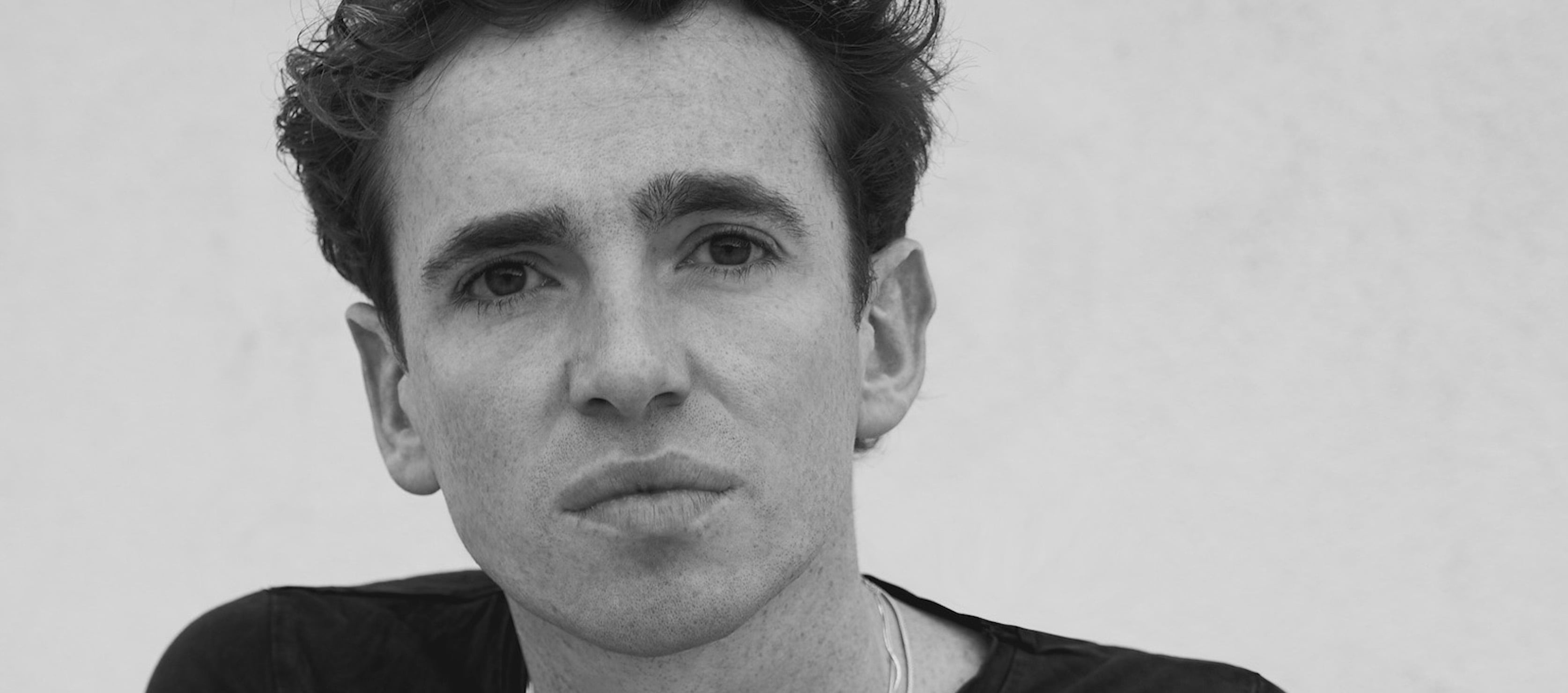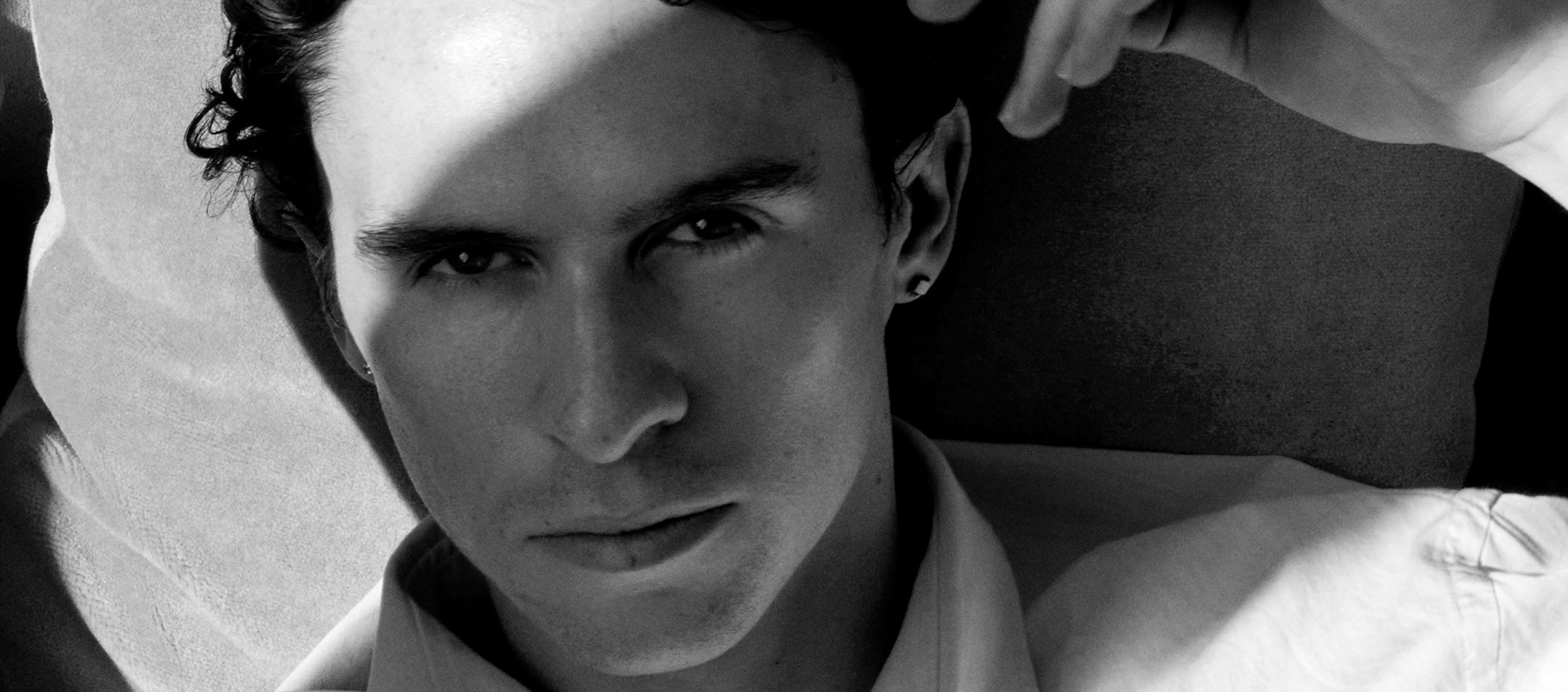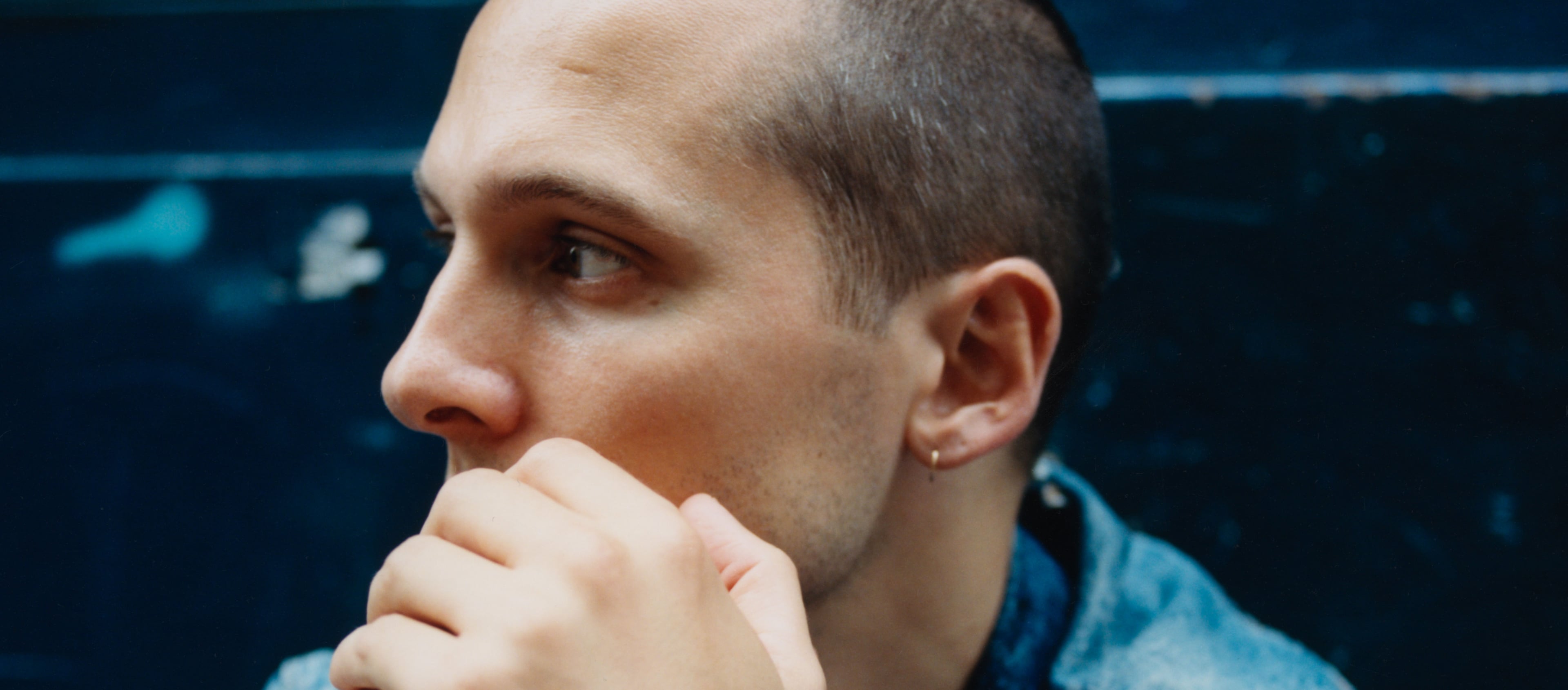For as long as the England-hailing star has been an actor, he’s favoured substance over stardom – at times, even forgoing billion-dollar franchises for roles he can really sink his teeth into. With Ryan Murphy’s Monster, he’s got the best of both worlds – playing one of history’s most notorious serial killers in one of the decade’s most talked about TV phenomena.
A rumbling train drowns out Charlie Hunnam just as he’s about to reveal the project he wishes he’d never taken. He laughs at the interruption, then doubles back – this time confessing the role he auditioned for but, thankfully, didn’t land. Before he can utter the project’s name, another blaring locomotive barrels past, silencing him again. “That train is my publicist!” he yells with a grin. “Preventing me from saying things I shouldn’t.”
Many people are lucky, but there’s more to it with Hunnam. Just a fleeting moment with him is enough to make you believe in karma, since karmic law tells us good things happen to good people, and, well, Charlie Hunnam is apparently very good. Hunnam is the kind of good that, instead of being tended to by a full staff, cleans his own home, pays his own bills, shops for his own groceries – despite being an international screen mainstay since his 2008 worldwide breakthrough as Jax Teller in Sons of Anarchy. “Fuck the glitz and glamour, hit ‘em with the Blitz and Hammer,” he says, quoting noughties UK rap legend Dizzee Rascal. Good like, when homophobia held strong through the 1990s, Hunnam attended equal rights demonstrations. “I was quite popular [there],” he smiles, although he probably understates. He’s so good that in this interview – one of many in which he will participate to promote his role as one of history’s most infamous serial killers in one of television’s most popular franchises – Hunnam is happily chatting well beyond our scheduled time, in direct defiance of his publicist (his officially appointed one, rather than the train).
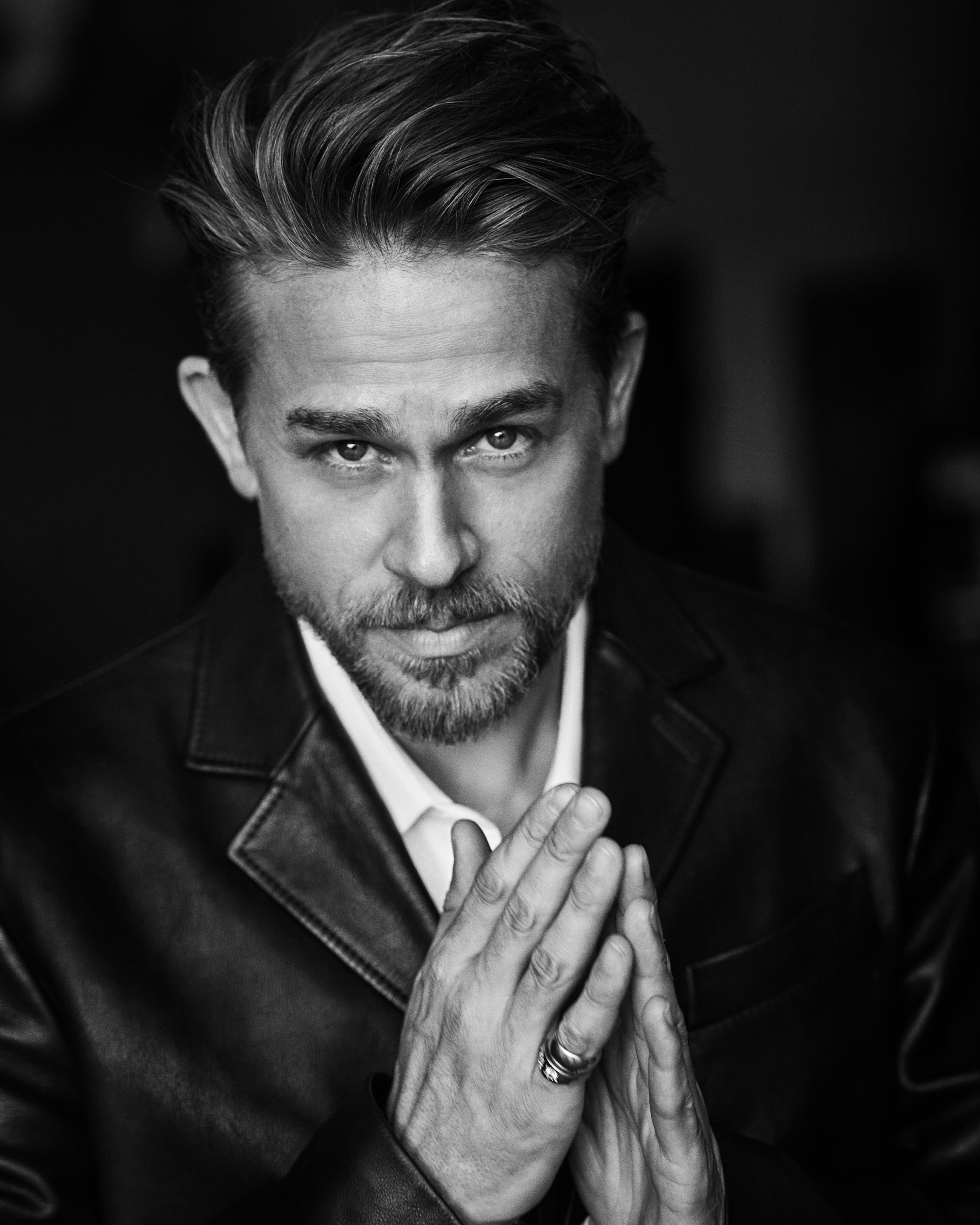
Charlie wears jacket & dress shirt LOUIS VUITTON; ring SHAY
Ed Gein, the actor’s latest lead role, was a two-time 1950s killer also famous for exhuming corpses, including that of his own mother. He has been the real-life inspiration for Norman Bates in Psycho, The Texas Chainsaw Massacre’s Leatherface, and now, Ryan Murphy’s exceedingly bingeable anthology series, Monster. The collaboration between Murphy and Hunnam was borne out of a two-hour lunch at Chateau Marmont, during which the former offered the Englishman the role on the spot. According to the star, it was a “mic drop” moment, and Hunnam instinctively accepted – script unseen. Over the next few weeks, the impostor syndrome had set in: “‘I don’t know what I’m going to be able to do if I can’t understand this guy,’” he thought.
But Murphy had done extensive research, presenting a show that unfurled mental illness with profound compassion. Hunnam approached the work in a similar vein, devouring any material that gave insight into Gein’s environment, activities and pathology. “I was thinking, ‘Why did he do what he did? How can I make him a human?’ He did horrendous things, but it’s also heartbreaking… I did find him to be a really tragic figure.”
Identifying with his characters – no matter their background, occupation, or sexuality – has become something of Hunnam’s superpower. Before roaring onto screens as Jax, the motorcycle gang leader in Sons of Anarchy, Hunnam was a 16-year-old from the Newcastle suburb of Byker (yes, really). He’d just been turned away by an acting agency when fate intervened: on Christmas Eve 1996, he happened to cross paths with the lone production manager of the only TV show filming within 200 miles. That chance meeting led to his first audition – 1999’s Queer As Folk, Russell T Davies’s groundbreaking drama about three gay friends in Manchester.
Queer As Folk ran for only two seasons, but its impact was seismic, cited as part of the cultural conversation that prompted the UK government to bring the age of consent for gay relationships in line with that of straight and lesbian couples in 2001. Hunnam, one of its three stars, was just 18 when it premiered.
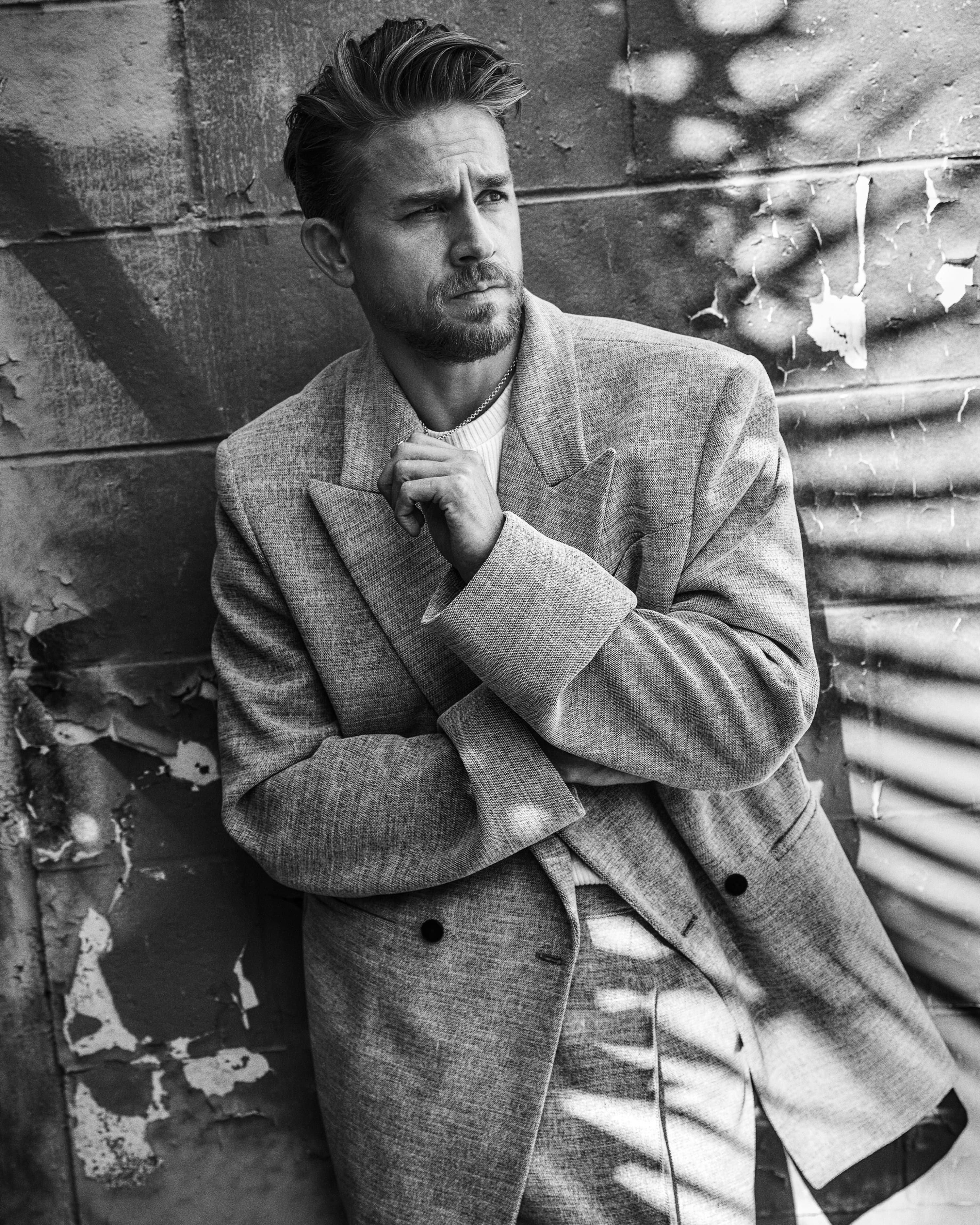
Charlie wears suit LOUIS GABRIEL NOUCHI; jumper AMIRI; chain & pendant FOUNDRAE
“I was certainly aware when it came out that we felt like we were doing something important,” he says. “Prior to that show a gay character on television’s entire storyline was that they were HIV positive or something like that – always reductive, like ‘This is all this person is.’ [Our] show was about three human beings living their lives with a whole plethora of relatable, real-life issues who just happened to be gay.”
The show’s success was enough to inspire a trip to LA. Hunnam was broke. The public service broadcasting fees of Queer As Folk’s network Channel 4 weren’t in the same ballpark as the Hollywood-sized cheques he’s latterly become accustomed to. But he was resourceful, and as a 19-year-old, he traversed the city via BMX bike. “I was marching confidently in the direction of my dreams,” he says, “and somehow the universe in those early days just really conspired to help me.”
That’s one way of looking at it. The actor took 103 meetings in 90 days without booking a single part, emerging from one audition to find his bike stripped down to the handlebars. Still, rejection rolled off him, even when the stakes felt stratospheric. Take the role of Anakin Skywalker, for which Hunnam was pitted against Hayden Christensen. “I remember oddly being fine about [not getting that role],” he says, recalling a moment when he was vis-à-vis with George Lucas in an awkward exchange about the weather. “It wasn’t one of those things that haunted me afterwards, and I am as much of a Star Wars fan as the next person. For some reason, I had some sense that maybe it just wasn’t for me.”
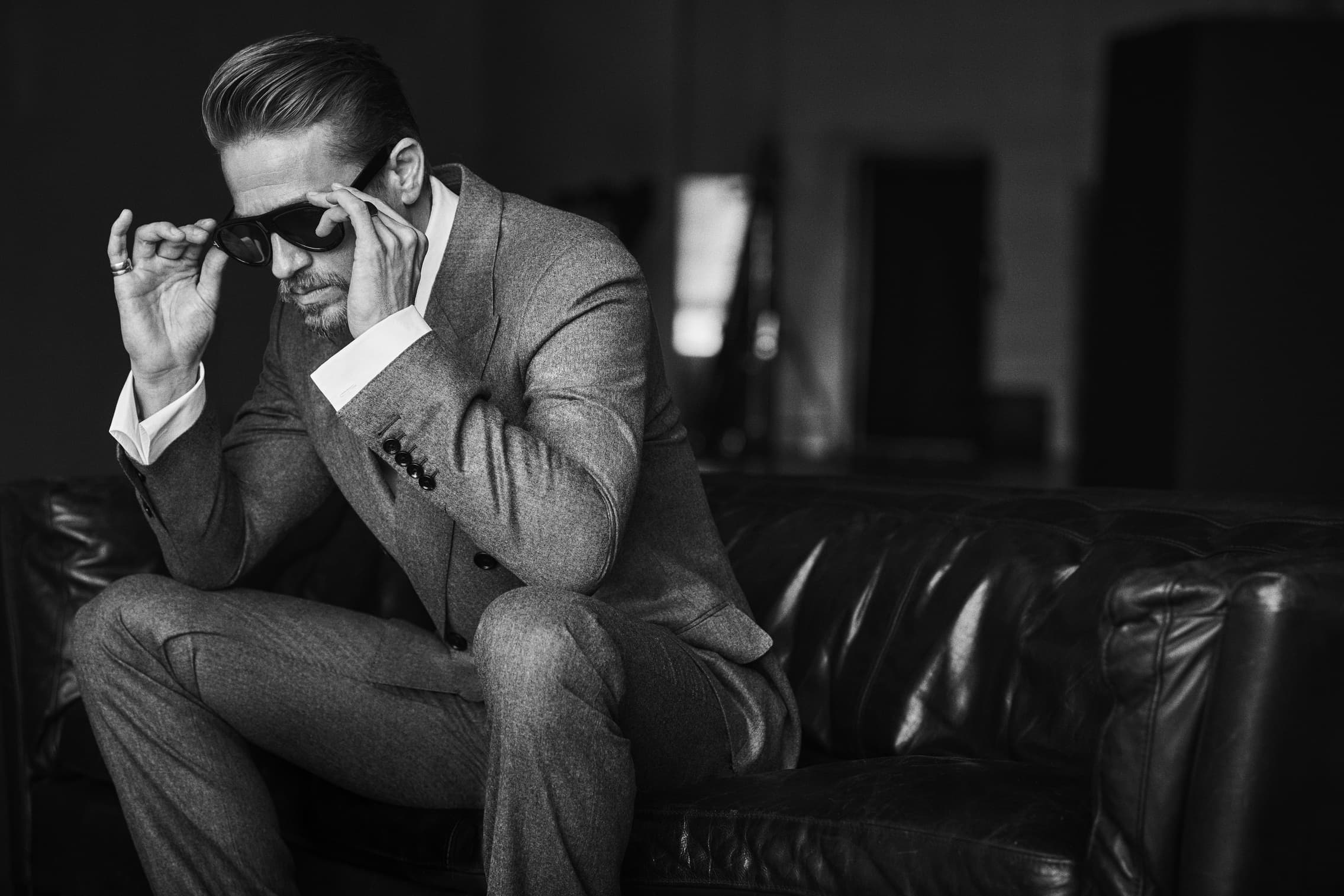
Charlie wears blazer, trousers, dress shirt, & sunglasses TOM FORD; ring DAVID YURMAN
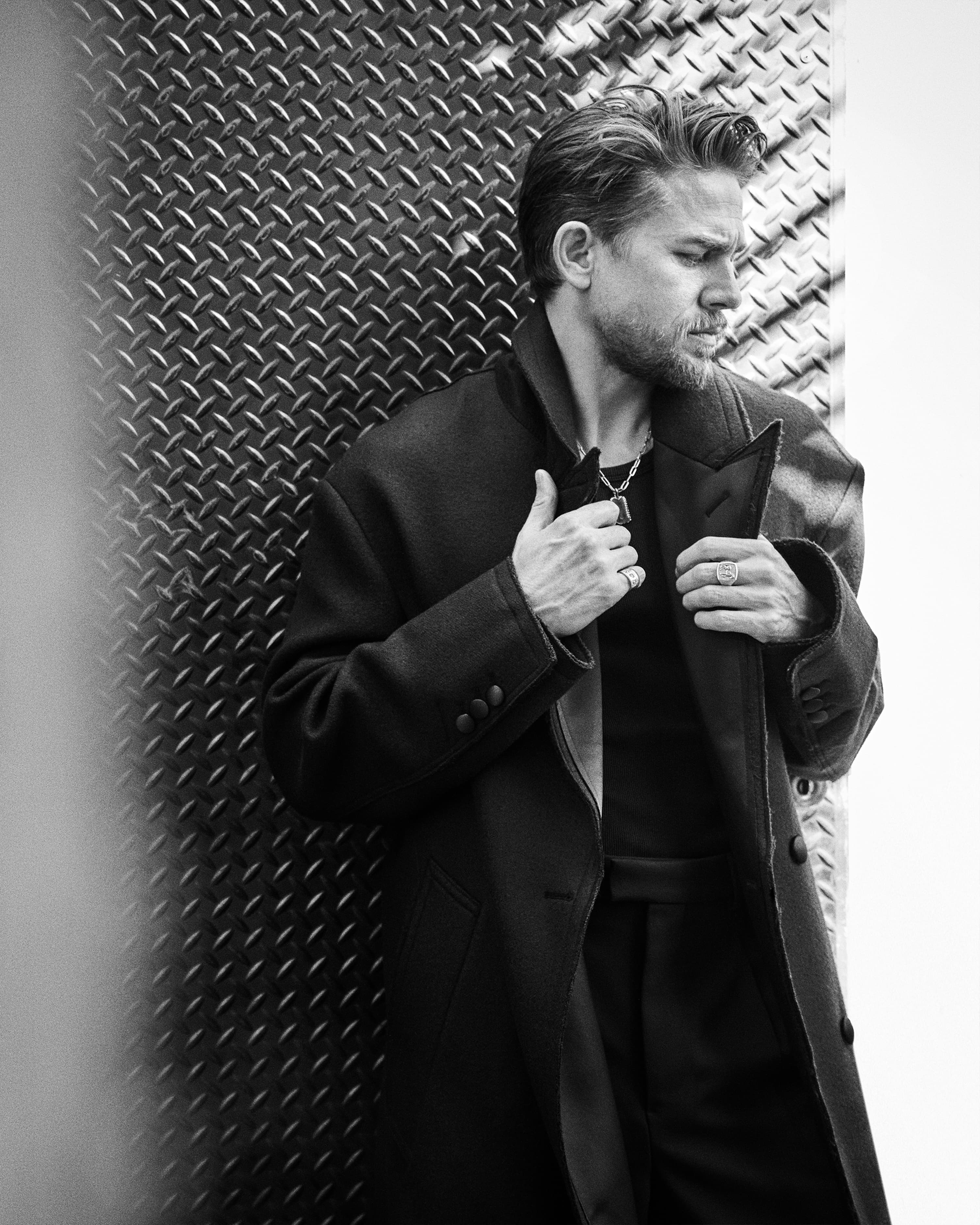
Charlie wears coat & sweater BRUNELLO CUCINELLI; trousers HERMES; ring SHAY
There’s an uncalculated honesty that anchors Hunnam’s every anecdote – in a way that almost makes you nervous. You feel that he could be on the precipice of revealing too much. It’s markedly un-Hollywood of him, and in any other circumstance, would be a journalist’s dream, but then the actor’s goodness rears its head again, and one’s natural protective instincts kick in. Basically – cue the train.
The next decade saw an upturn for the young actor. His early twenties spanned Nicholas Nickleby opposite Anne Hathaway and Cold Mountain alongside Nicole Kidman and Philip Seymour Hoffman. Asked today about his most influential acting partner, he lands on Aiden Gillen – better known to Game of Thrones loyalists as Lord Petyr “Littlefinger” Baelish – whose dedication to the craft he likens to a “plumber dedicated to making a system work. He just was in it to win it… not interested in the outside trappings [of fame]. I’ve always remained so grateful for exposure to him. Now, I have [the same] approach to acting.”
That blue-collar mindset meant Hunnam was never going to find fulfillment in the usual markers of success – awards, accolades, etc. This has been reinforced by friend and therapist-to-the-stars Phil Stutz, who told Hunnam he’s long kept Monday post-Oscars completely free for despairing clients – not the losers, the winners. “It’s like, ‘I just got to the top of the mountain,’” Hunnam says, describing their general sentiment. “‘I don’t feel any different… and now I don’t know what the fuck to do?’” The actor, instead, is driven by a challenge. Projects that induce a fear, so he can run into the cave and face the dragon, as it were. Although more often than not, the dragon isn’t a demanding role, but the unending silence when the phone doesn’t ring.
“I think Hollywood is analogous to the stock market,” he says. “If you are going to do well in the stock market, you have to be in it for the long haul. Don’t get tempted to sell when it’s really high and don’t panic and sell when it’s really low.”
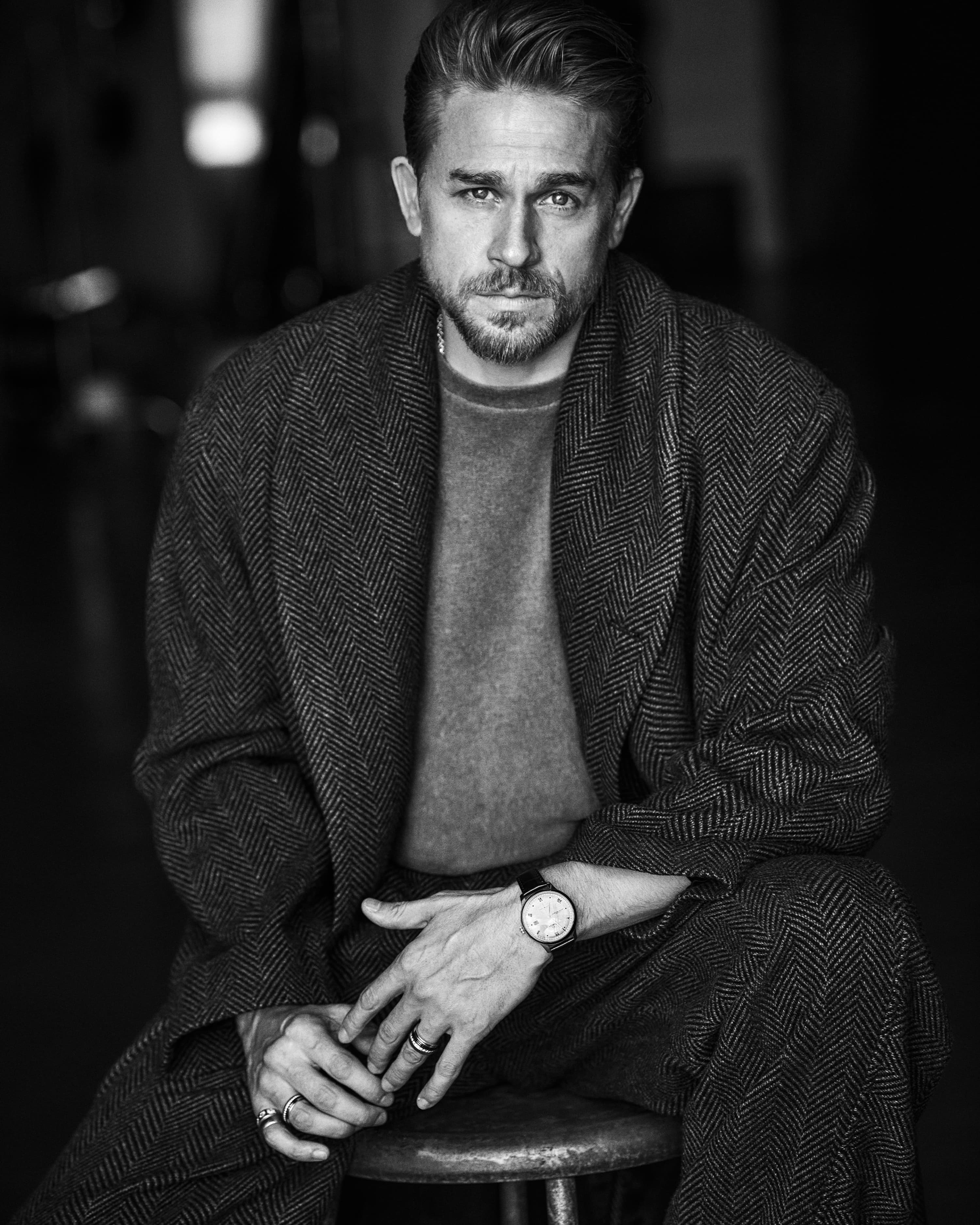
Charlie wears coat, jumper & trousers GIORGIO ARMANI; ring BOUCHERON; pinky rings Charlie's own; timepiece OMEGA
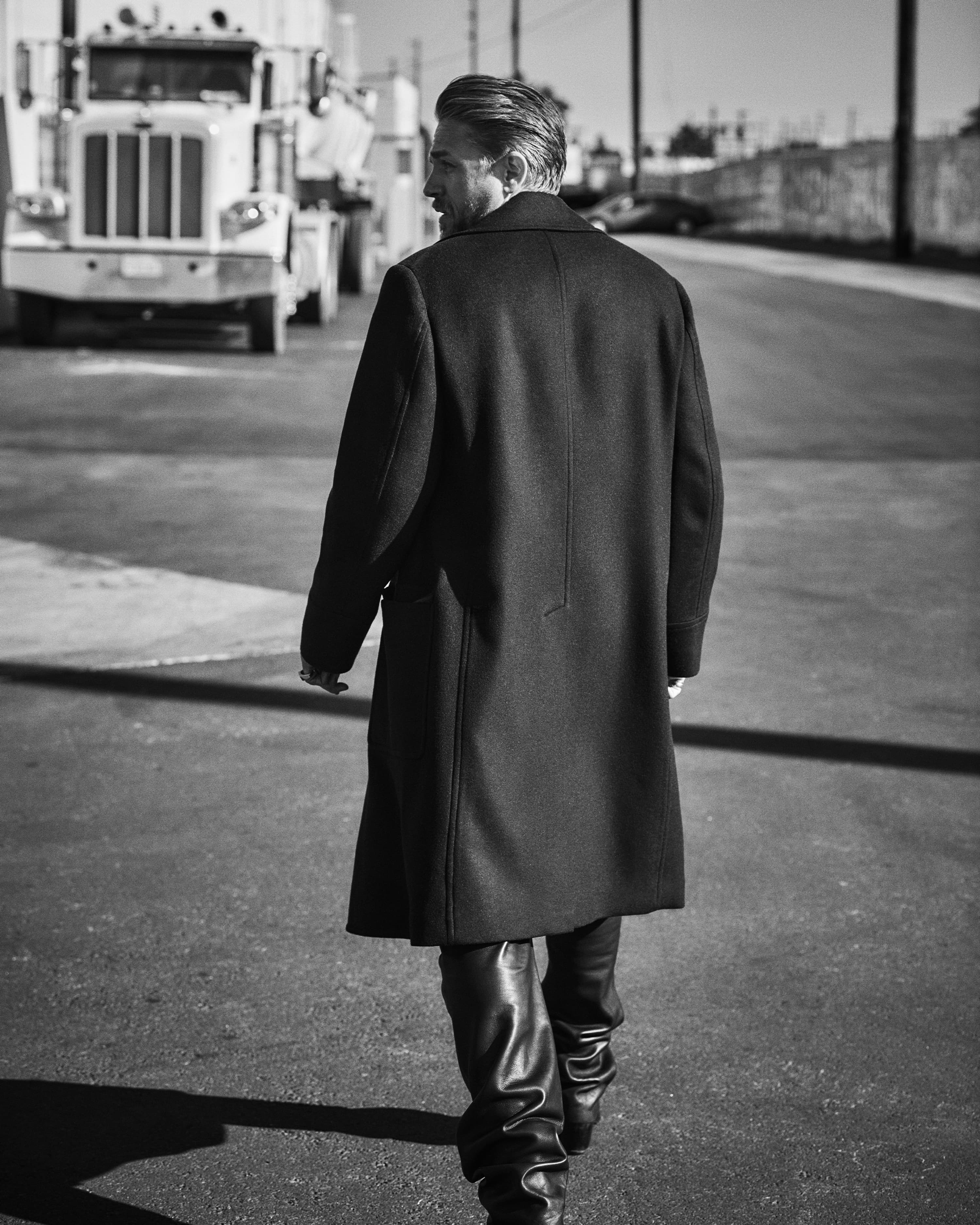
Charlie wears coat BRUNELLO CUCINELLI; trousers HERMÈS ; boots CELINE; ring SHAY
Hunnam can recall various points when his career stalled. Much like the Star Wars saga, he’d come within spitting distance of high-level projects… before the rug was abruptly pulled from under him, or he himself did the pulling (Fifty Shades of Grey fans will remember Hunnam was cast as the eponymous Christian Grey, dropping out of the film weeks before shooting after feeling “totally at odds” with the creative vision).
“[This industry] is about self-belief,” Hunnam says, “and that is a hard thing to cultivate. I’ve done multiple periods where [being out of work] was by choice and a couple of times when it wasn’t at all by choice.”
In one instance, a low period led to a full pivot. Affording himself an 18-month hiatus from acting, the actor wrote and sold a screenplay while unread scripts piled high on his desk. Eventually, unable to ignore them any longer, he pulled out the thinnest one – a pilot. Instantly gripped by the father-son relationship that underscored the show’s gruff premise, Hunnam swept the rest aside. In Sons of Anarchy, he’d found his dragon.
“It ran deep for me, honestly. It was all about a father and son and where Jax belongs in the world, and I had a lot of stuff to figure out with my own dad. He had been a scrap metal man and thought that my brother and I would take over his business – and that’s a really tough business – but I wanted to be an artist.”
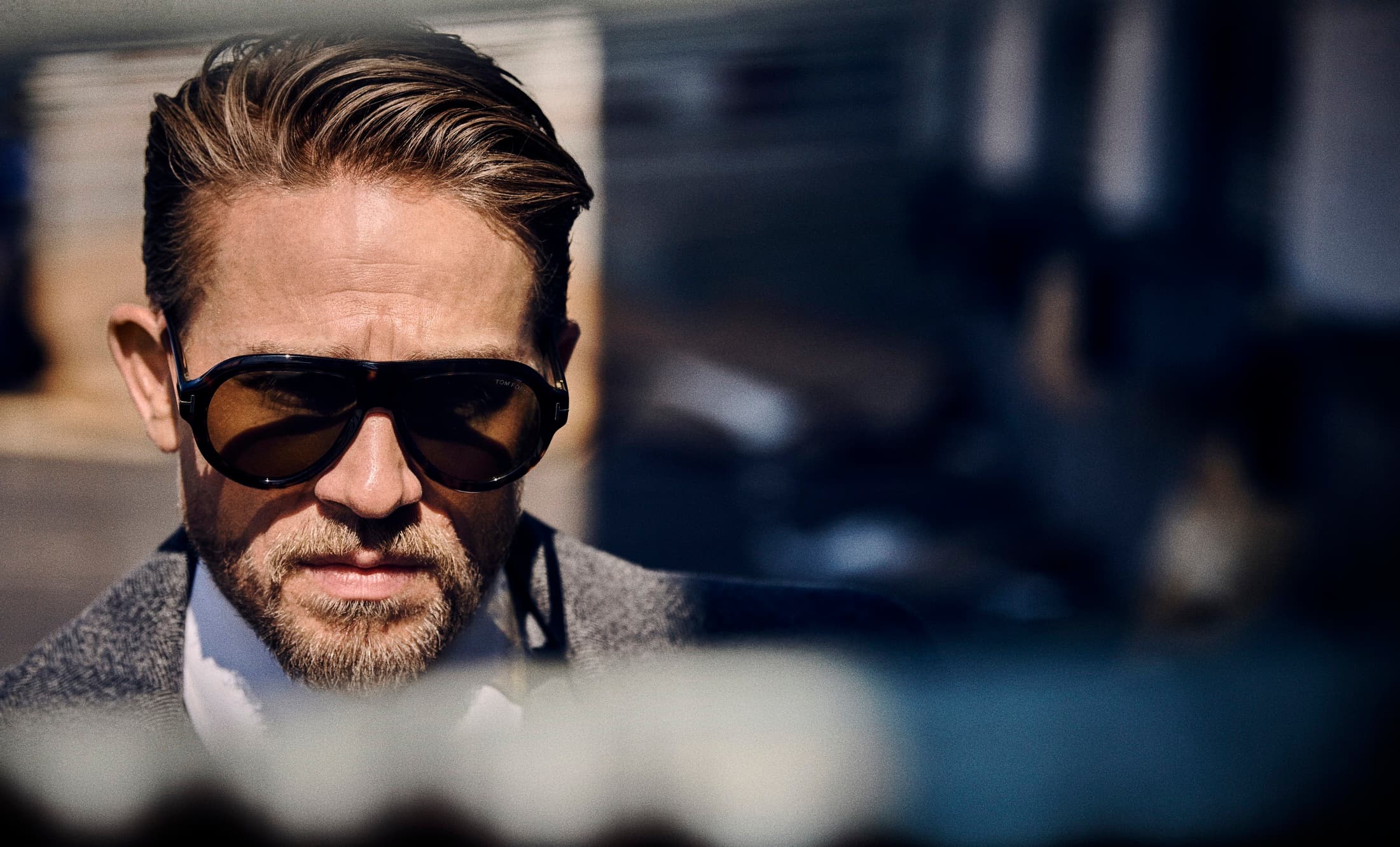
Charlie wears blazer, dress shirt & sunglasses TOM FORD
It seems as though forgoing the beaten path may have been worth it. Around 200 people have approached Hunnam to share that they named their child Jax – a definitive sign, if ever there was one, of the show’s lasting impact. Although when it came time to face the next demon, it wasn’t his father who came to mind, it was his mum. “Ed Gein’s mother was the only person in this whole world that he’d ever had a relationship with,” Hunnam explains. “His first crime was to go and dig up his mother because she was his only contact.”
Hunnam avoided speaking to his mother much about Monster, worried she might be concerned for his state of mind. It was a valid concern. After he finished shooting in Chicago, Hunnam’s partner, jewellery designer Morgana McNelis, advised him to take time to distance himself from the character before returning to their home in LA. He drove up to Wisconsin to visit Ed Gein’s grave, feeling again that the powers that be, this time, perhaps, supernatural, had come to his aid.
“I wanted to be very clear that he wasn’t coming with me on my journey forward and that I wanted to say goodbye,” Hunnam explains. “But it was a fucking trip being in that cemetery, because it’s the same cemetery where he was body snatching. And his mother was right there next to me.”
When Hunnam walked out of that Wisconsin cemetery, he let go of Gein, intent on emerging from the dragon’s cave unscathed, the same way he’s spent a quarter-century in Hollywood without succumbing to the city’s vapidity. He claims one can’t be mired in darkness when you are creating light, but it feels deeper than that. Like the universe was once again protecting him, propelling him on to conquer the next dragon. Or maybe it’s Charlie Hunnam’s goodness triumphing over evil.
“I feel real gratitude to be able to work consistently in a business that’s incredibly competitive – incredibly hard,” Hunnam says. “I never take that for granted. And so I have a craftsman’s mentality. I am a plumber.”
Photography
Matthew BrookesStyling
Christian StrobleGrooming
Kim Verbeck at The Wall GroupPhotography Assistants
Kurt Mangom, Arden CoreStyling Assistant
Gaia KhatchadouriaVideography
Courtney BrookesSpecial Thanks
APG WestEditor-in-chief
Luke DaySenior Editor
Andrew WrightArt Director
Michael MortonProduction Director
Lola RandallJunior Art Director
Natasha Lesiakowska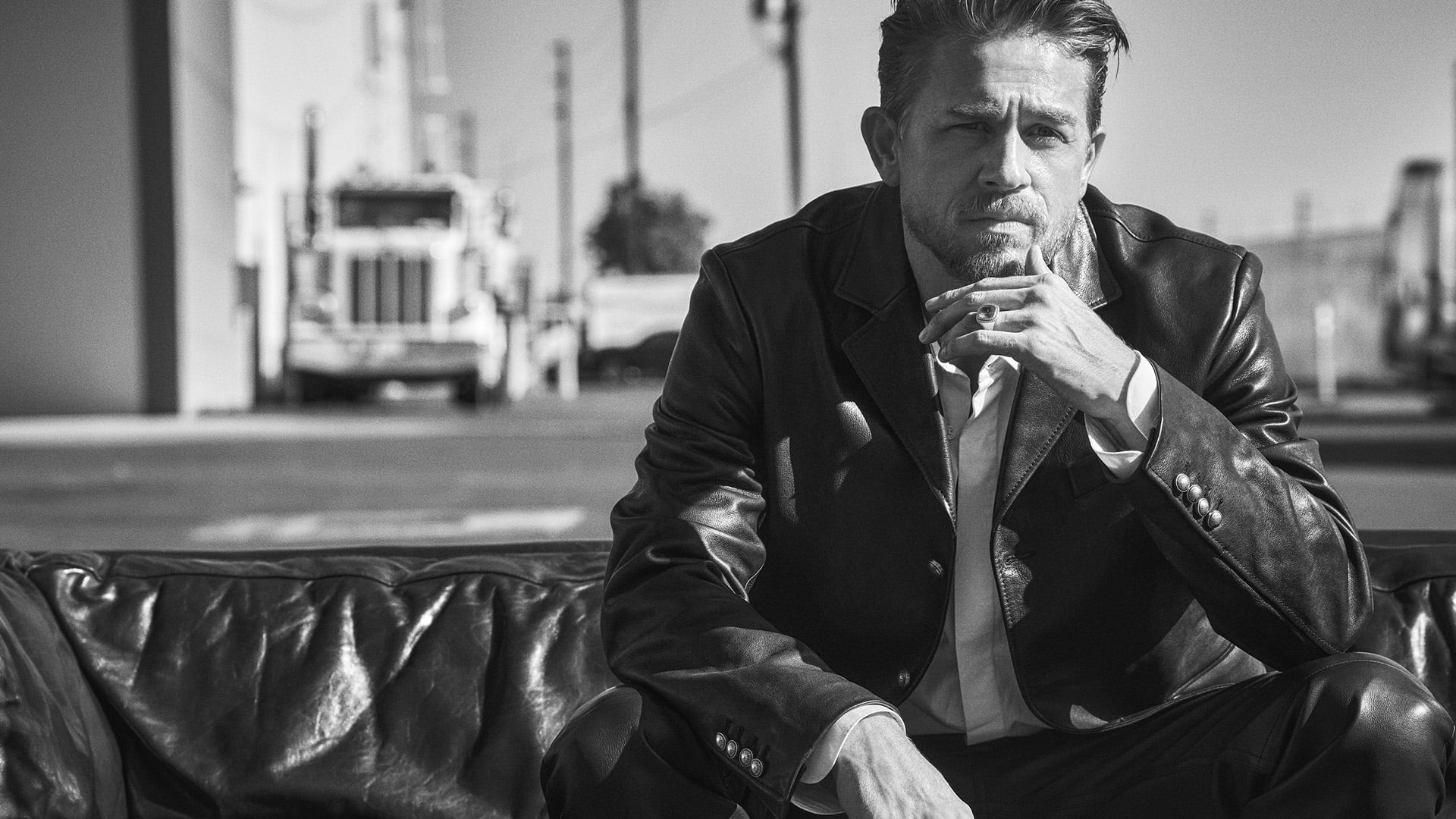
![Picture of “When We Were Developing Series [2], We Were Very Conscious Of The Live Debate About What It Means To Be British”: Tom Hiddleston On The Night Manager’s 2020s Comeback](/_next/image?url=https%3A%2F%2Fadmin.manabouttown.tv%2Fwp-content%2Fuploads%2F2026%2F02%2Fdigsfo-768x338.jpg&w=3840&q=85&dpl=dpl_AhPDpVcvBHi6ZdoK89nsTL2Qj1WA)
![Picture of “[The Bridgerton Press Tour] Is Like Being On Some Sort Of Hallucinogenic Drug”: Luke Thompson Is Next In Line](/_next/image?url=https%3A%2F%2Fadmin.manabouttown.tv%2Fwp-content%2Fuploads%2F2026%2F01%2FLUKE-THOMPSON-hero-768x339.jpg&w=3840&q=85&dpl=dpl_AhPDpVcvBHi6ZdoK89nsTL2Qj1WA)
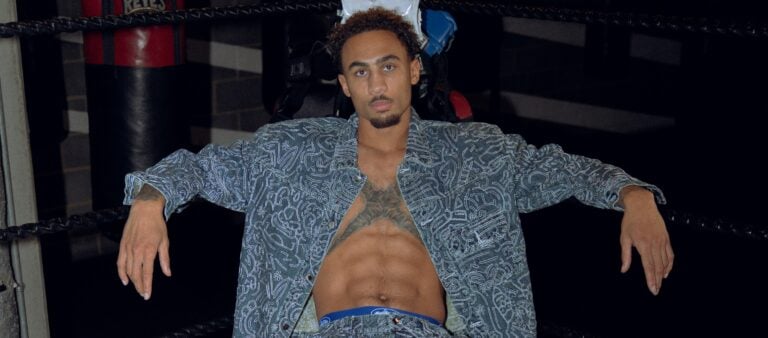
![Picture of “[Whether Photographing] A Dustman Or The Queen, I Will Try My Best – But, Naturally, The Queen Was A One-Off”: David Montgomery On Capturing Icons](/_next/image?url=https%3A%2F%2Fadmin.manabouttown.tv%2Fwp-content%2Fuploads%2F2025%2F12%2FDM-Hero.jpg&w=3840&q=85&dpl=dpl_AhPDpVcvBHi6ZdoK89nsTL2Qj1WA)
